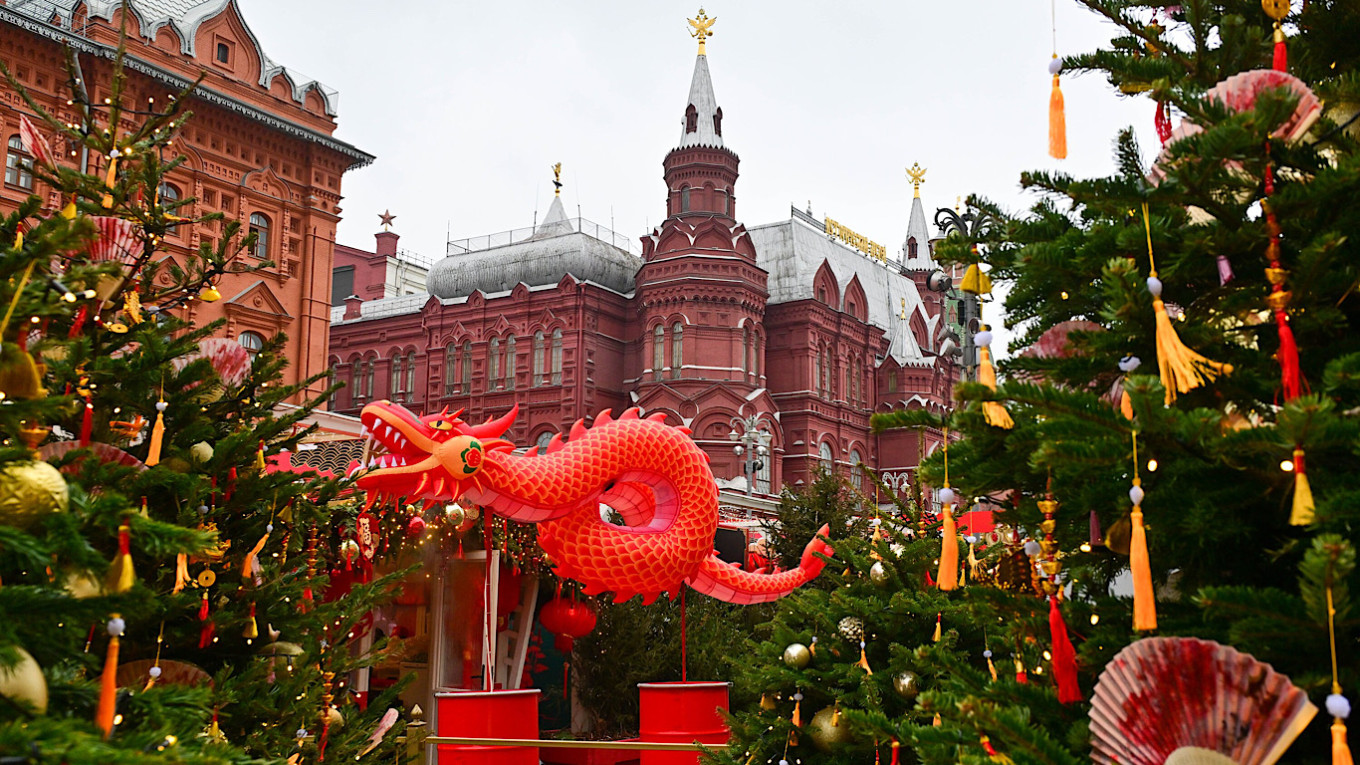During a recent meeting in Beijing, President Vladimir Putin praised the relationship between Russia and China, declaring it to be at an “unprecedented level.”
Beyond high-profile diplomatic engagements, the influence of China in daily Russian life is becoming ever more significant, permeating areas such as language, art, tourism, and consumer products.
One year ago, amidst enthusiastic applause at the National Grand Theatre in Beijing, Putin and Xi Jinping declared 2024-2025 as the Cultural Years of China and Russia, coordinating over 230 events in nearly 100 cities in both nations.
The State Tretyakov Gallery in Moscow is currently featuring works by contemporary Chinese artist Han Yuchen, who is recognized for his oil paintings, photography, and calligraphy.
This past April, the Shenzhen Opera and Dance Theatre performed “Wing Chun” at Moscow’s renowned Bolshoi Theatre, which reciprocated with a tour to Beijing and Shenzhen in May.
This year’s Chinese New Year celebrations at Manezhnaya Ploshchad in central Moscow drew such large crowds that attendees began lining up well before the gates opened.
Following the onset of Russia’s extensive military campaign in Ukraine in 2022, Western countries severed cultural ties with Moscow alongside imposing economic and political sanctions.
Russia’s pivot towards China was already in progress before this event. However, the Ukraine conflict—along with the consequent deterioration of Russia’s relations with the West—has made China’s influence in Russian society more visible than ever, as noted by Temur Umarov, a fellow at the Carnegie Russia Eurasia Center.
“Through this approach, Russia wishes to showcase its connections with the global community—not necessarily with the West, but with China,” he stated.
An increasing number of Russians are eager to learn Chinese, considering it a valuable asset for their careers, alongside English.
Chinese is now the second most popular foreign language among affluent Russians, only behind English. The number of schools in Moscow offering Chinese language classes has surged by 123%.
According to a survey by the job search website SuperJob, demand for professionals fluent in Chinese has increased by over 1.6 times from 2023 to 2024, with the transport and logistics sectors showing the highest demand.
“Chinese is indeed gaining popularity,” said a Russian woman who is studying the language, speaking under the condition of anonymity for her safety. “Initially, I was attracted to its distinctiveness, but I later realized its potential due to the growing interest in China and its market.”
Another learner mentioned that greater job opportunities motivated her to pursue the language.
“There are numerous positions available that require Chinese language skills, particularly in logistics and economics,” she remarked.
Currently, at least 80,000 individuals in Russia are engaged in learning Chinese.
Putin also announced that Russia and China will celebrate the Cross Years of Education in 2026-2027, with over 51,000 Chinese students currently studying in Russia and about 21,000 Russians enrolled in Chinese educational institutions.
Temur Umarov highlighted that while China’s visibility in everyday Russian life has increased, it could be perceived as somewhat “artificial.”
“As Russia’s relations with European and Western nations grew worse, China’s presence in Russia intensified,” Umarov shared with The Moscow Times.
Many Russians have been exposed to Chinese consumer culture for quite some time. The “Made in China” tag is prevalent on various products, ranging from smartphones to footwear, particularly since Western sanctions limited access to certain goods.
According to a poll by the independent Levada Center, 71% of Russian respondents reported having worn Chinese clothing, while 57% indicated they had worn Chinese shoes.
Tourism contributes another dimension. Although only about 6% of Russians have visited China—much lower than those who travel to Europe or the United States—this figure is considerably higher in Russia’s Far East, where close to half the population has crossed the border, according to Levada.
The impending introduction of a visa-free regime, which will allow Russians to travel within China for up to 30 days starting September 15, is anticipated to further boost tourism, shopping, and interpersonal interactions. Putin has assured that a similar arrangement for Chinese citizens will be implemented by Russia.
Levada Center surveys indicate that public perceptions of China have notably transformed over the past twenty years.
Currently, two-thirds of respondents regard China as a “major power,” a significant increase from just one-fifth two decades ago.
Levada noted that Russians’ views of China were largely shaped during Russia’s tensions with the West surrounding Ukraine in the mid-2010s. In 2014, the year Russia annexed Crimea and supported eastern Ukrainian separatists, the percentage of Russians viewing China as a friendly country doubled from 20% to 40%.
A similar increase occurred following the full-scale invasion of Ukraine, with 65% of respondents now considering China a friendly nation and favorable views reaching a record high of 92%.
According to Levada, some view the current Russo-Chinese relationship as one-sided, with China benefiting more, casting Russia as a “raw materials appendage” and market for Chinese products.
Nonetheless, when directly asked if they perceive China as a threat to Russia, only 20% of respondents agreed, while the overwhelming majority—72%—disagreed.
Umarov remarked that changes in survey responses can be attributed not just to actual geopolitical circumstances but also to their portrayal in the media.
“At present, China is seen as an ally,” he explained to The Moscow Times. “Thus, survey results tend to reflect a favorable attitude toward China—these responses are primarily shaped by what is communicated to the public through official channels.”

